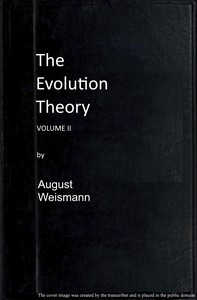The Evolution Theory, Vol. 2 of 2 by August Weismann
"The Evolution Theory, Vol. 2 of 2" by August Weismann is a scientific publication written in the early 20th century. This work is focused on biological evolution, particularly exploring concepts related to regeneration, inheritance, and the mechanisms of evolution as understood in that era. The book elaborates on the principles of heritable traits and how they are transmitted across generations, contributing to a foundational understanding of evolutionary biology. At the start of
the volume, Weismann introduces the topic of regeneration, discussing the various forms it takes in different organisms and the underlying biological principles. He emphasizes that regeneration is an adaptive phenomenon, varying widely between species based on their exposure to injuries and environmental conditions. He argues that regeneration is not a universal trait but rather a complex capacity that has evolved as a response to specific survival needs. Through a detailed examination of examples such as hydra, newts, and earthworms, Weismann sets the stage for an in-depth exploration of the processes that govern regeneration and heredity, laying the groundwork for the subsequent chapters in the book. (This is an automatically generated summary.)
Read or download for free
| How to read | Url | Size | |||
|---|---|---|---|---|---|
| Read now! | https://www.gutenberg.org/ebooks/65049.html.images | 1.2 MB | |||
| EPUB3 (E-readers incl. Send-to-Kindle) | https://www.gutenberg.org/ebooks/65049.epub3.images | 3.6 MB | |||
| EPUB (older E-readers) | https://www.gutenberg.org/ebooks/65049.epub.images | 3.6 MB | |||
| EPUB (no images, older E-readers) | https://www.gutenberg.org/ebooks/65049.epub.noimages | 510 kB | |||
| Kindle | https://www.gutenberg.org/ebooks/65049.kf8.images | 3.9 MB | |||
| older Kindles | https://www.gutenberg.org/ebooks/65049.kindle.images | 3.8 MB | |||
| Plain Text UTF-8 | https://www.gutenberg.org/ebooks/65049.txt.utf-8 | 1.1 MB | |||
| Download HTML (zip) | https://www.gutenberg.org/cache/epub/65049/pg65049-h.zip | 3.5 MB | |||
| There may be more files related to this item. | |||||
Similar Books
About this eBook
| Author | Weismann, August, 1834-1914 |
|---|---|
| Translator | Thomson, J. Arthur (John Arthur), 1861-1933 |
| Translator | Thomson, Margaret R. |
| Title | The Evolution Theory, Vol. 2 of 2 |
| Credits | Constanze Hofmann, Alan, Marilynda Fraser-Cunliffe and the Online Distributed Proofreading Team at www.pgdp.net (This book was produced from images made available by the HathiTrust Digital Library.) |
| Reading Level | Reading ease score: 35.2 (College-level). Difficult to read. |
| Language | English |
| LoC Class | QH: Science: Natural history |
| Subject | Evolution (Biology) |
| Category | Text |
| EBook-No. | 65049 |
| Release Date | Apr 10, 2021 |
| Most Recently Updated | Oct 18, 2024 |
| Copyright Status | Public domain in the USA. |
| Downloads | 442 downloads in the last 30 days. |
| Project Gutenberg eBooks are always free! | |

